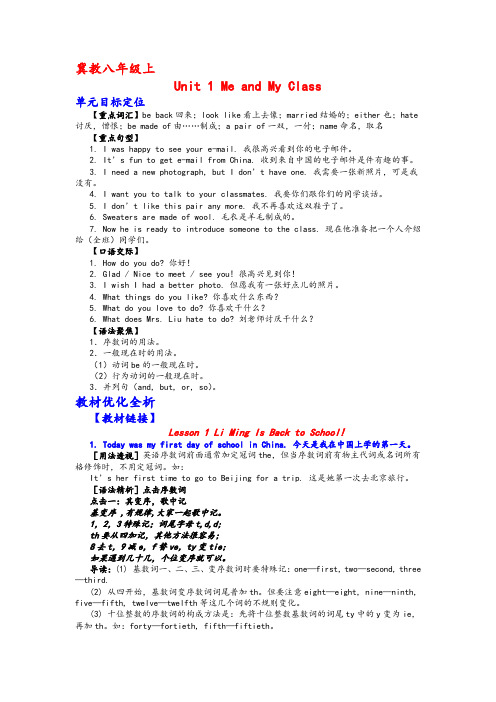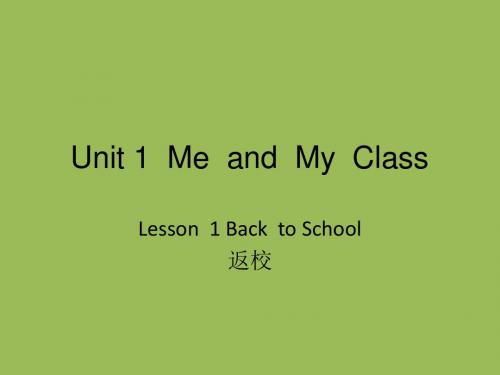八年级英语me-and-my-class课件1
- 格式:ppt
- 大小:352.00 KB
- 文档页数:16


冀教八年级上Unit 1 Me and My Class单元目标定位【重点词汇】be back回来;look like看上去像;married结婚的;either也;hate 讨厌,憎恨;be made of由……制成;a pair of一双,一付;name命名,取名【重点句型】1. I was happy to see your e-mail. 我很高兴看到你的电子邮件。
2. It’s fun to get e-mail from China. 收到来自中国的电子邮件是件有趣的事。
3. I need a new photograph, but I don’t have one. 我需要一张新照片,可是我没有。
4. I want you to talk to your classmates. 我要你们跟你们的同学谈话。
5. I don’t like this pair any more. 我不再喜欢这双鞋子了。
6. Sweaters are made of wool. 毛衣是羊毛制成的。
7. Now he is ready to introduce someone to the class. 现在他准备把一个人介绍给(全班)同学们。
【口语交际】1. How do you do? 你好!2. Glad / Nice to meet / see you! 很高兴见到你!3. I wish I had a better photo. 但愿我有一张好点儿的照片。
4. What things do you like? 你喜欢什么东西?5. What do you love to do? 你喜欢干什么?6. What does Mrs. Liu hate to do? 刘老师讨厌干什么?【语法聚焦】1.序数词的用法。
2.一般现在时的用法。
(1)动词be的一般现在时。
(2)行为动词的一般现在时。
3.并列句(and, but, or, so)。




Unit 1 Me and My ClassLesson 6 Jenny’s Week【学习目标】1.熟练掌握本课的重点单词,短语和句型。
2.能够理解课文内容,完成课本上的习题。
【自主学习】---明确目标自学文本任务一:根据Lesson 6 Jenny’s Week预习课件掌握本节课的四会单词和短语:任务二:听录音跟读Lesson 6 Jenny’s Week课文,跟读2-3遍,了解对话大意。
并完成书中13页的练习题任务三:认真学习下面的知识点,标记出不理解的地方1.on weekends在周末美国人习惯用on weekends/on the weekend;英国人习惯用at weekends/at the weekend。
2.on one team在一个队里on是介词,意为“为(某团体或组织)的一员”。
3.buy sth. for sb.sb. sth. 为某人买某物My uncle bought a bike for me on my birthday.=My uncle bought me a bike on my birthday.我叔叔在我过生日时给我买了一辆自行车。
4.a pair o f 一双,一对,一副后面通常接shoes,boots,socks, jeans, glasses, trousers等名词。
如果“a pair of+名词”结构作主语,其谓语动词通常与pair的数保持一致。
This pair of trousers is very cheap.这条裤子很便宜。
5.have the pleasure of doing sth.很高兴做某事I had the pleasure of meeting you.我很高兴见到你。
【拓展】“With pleasure.”意为“很愿意”,用于回答别人的请求或邀请。
“It's a pleasure”意为“别客气;不用谢”,用于回答别人的道谢。
Unit 1Me and my class重要句子讲练Lesson 11.It is fun to get e-mail from China.受到从中国来的电子邮件是很有趣的。
to get e-mail from China 为动词不定式短语在句中作实际主语,it为形式主语。
上句可变成:To get e-mail from China is fun.例句: To study hard is important.(=It is important to study hard.)2.On Wednesday, my cousin Brian arrives from the U.K.星期三,我的堂兄布莱恩从英国来到这里。
arrive 到达,不及物动词,不能跟宾语arrive, get to, reach 都有到达的意思。
arrive可以单独使用,不用跟宾语,如果后面要跟地点,需加介词in或at;get to和reach不能单独使用,后面直接跟地点。
例句:The train is coming. 火车就要来了。
When did you arrive in Beijing? 你什么时间到的北京?I got to the station at 7:30.我7:30到达了火车站。
3. We go from room to room for our class. 我们逐屋(教室)上课。
from…to… 从…到…, from Beijing to Shanghai 从北京到上海Lesson 21.Think about your favourite photo of yourself. 想一下你最喜欢的一张你自己的照片。
yourself 是反身代词,意识是“你自己”反身代词主要用于强调,有“亲自”的意思,可以放在有些动词或介词后面,作他们的宾语,表示“自己”的意思。
例句:Don’t hurt yourself.不要弄伤你自己。